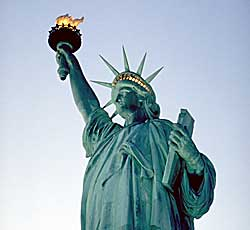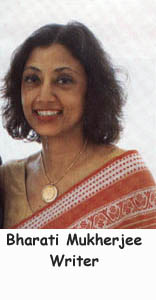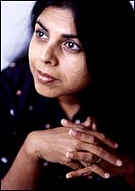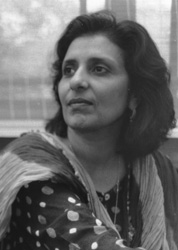 |
LITR 5831 Seminar in
Multicultural Literature:
American Immigrant Literature |
 |
Brexit vote Thursday, 23 June
immigrants expect a higher standard of living but can't imagine giving up their culture as entirely as assimilation implies
Christopher Caldwell, "Europe’s Other Crisis"
Question: USA has fewer problems with Muslim immigration than Europe, fewer violent outbreaks. After web review . . . why?
USA as "nation of many nations," e pluribus unum, but European nations are defined more by a "folk" or "national culture"; i.e., France is defined by the French people; England by the English character or soul, etc. So what happens to such a national culture when it experiences high immigration from a different culture--a pattern to which the USA is somewhat accustomed?
2 family, community support
[4] All Western European countries have some version of this problem, which involves immigration, Islam, dissent from established European culture, and organized violence.
[6] The grim fact is that no Western European country—not one—has managed even a marginally successful integration of its Muslim immigrants, despite half a century of vast treasury outlays, wholesale constitutional re-workings, and indefatigable excuse-making.
19-20 colonization
33 nation as governing social unit
|
r |
 |
 Chitra Divakaruni |
 Tahira Naqvi |



Asian immigrants are the "model immigrants" in the late 20th, early 21st centuries--especially South Asian immigrants
Comparable to Jewish immigrants in early 20th century
What makes these groups so outstanding or exemplary?
What are the qualities of a "model immigrant?"
What makes these groups so outstanding or exemplary?
Both groups immigrate from far away, across ocean--increases commitment (compared to New World immigrants, who may not lose connection to home country)
Both Jewish and South Asian immigrants to US often arrive with strong commitment to education and professional advancement.
South Asian immigrants are another "model immigrant group," a. k. a. "model minority"--compare East Asian groups (Chinese, Japanese, Koreans) from third class meeting.
Reprise: how do the stories exemplify the immigrant narrative?
Pay forward: how do these groups already resemble the dominant culture?
Indian-Americans (not American Indians) probably the most distinguished group of immigrant authors in our lifetime; compare Jewish-American writers a century ago.
Pulitzer Prize winners, considerable international prestige
Why? What history contributes to their prestige and quality?
Indian writers as outstanding figures in World Literature during recent generation:
Salman Rushdie
Arundhati Roy
V. S. Naipaul
Bharati Mukherjee
Jhumpa Lahiri
Chitra Divakaruni
TV article: Why are Indian Americans so great?
language skills and literacy--compare to Jews, Puritans and Pilgrims--all highly literate peoples
Minority Literature objective: "literacy = path to empowerment"
Indian immigrant writers are extraordinary because it's not their children writing literature, but the immigrants themselves
Why?
British empire!
British empire influences or establishes Indian schools
English becomes language of convenience for multilingual India (14 major languages, 700+ dialects)
Not only do Indian writers often know English beforehand, but often with prestige of British accent.
Both Jewish and South Asian immigrants to US often arrive with strong commitment to education and professional advancement.
Divakaruni 76 imagination . . . Modern Novel class at the university
Compare to central American immigrants, who are often (not always) poor and lacking education traditions
Here's why South Asians show up in such good shape:
1. The trip is so far and long that only fairly well-off people can afford it.
2. Poor and uneducated workers of South Asia emigrate to nearer areas to sell their labor: especially oil-rich Arab countries. . . . "guest workers"
what is the dominant culture that they join?
Where did it come from? How did it start? What are its qualities?
"Thank God for the Jews"
229-30 Kamal at hospital, seeing patients [ > professional status] Model minority as math, music, medicine
232 A tall, handsome reporter, who, with his upturned coat collar and straw-colored, wind-swept hair, seemed to belong in an ad for Burberry's in The New Yorker, was saying something about "recent acts of terrorism" in a faraway voice. An Israeli School bus had been bombed. . . An Arab village in ruins. . . . An old woman cried without restraint . . . .
233 The handsome, roving reporter, unchanged in his appearance, disconnected still from his surroundings, was speaking in a crisp accent that wasn't anything like what she heard on the streets in New York or Westville . . . .
Qualities of dominant culture observable in this example:
"detached" quality--dominant culture always pulling away, heading into future
This "detached" quality can make the dominant culture elusive, hard to pin down or criticize
"Detached" can turn into a quality of "purity" or resistance to others' efforts at assimilation to it
The ethnic identity of the dominant culture is "unmarked." Compare to "Israeli school bus" and "Arab village."
What ethnicity is the reporter?
detached as unmarked?
If anything, Anglo-American or Northern European, but hard to say.
Divakaruni 70 stewardess so blond, so American
Dominant culture is "unmarked." Immigrant and minority cultures are "marked," but by assimilation they can become "unmarked."
"Thank God for the Jews"
230-1 Islamic women between tradition and modernity . . . "All this nonsense about bleeding the animal . . . It's ridiculous!"
232 "They've already forgotten their ways."
232 custom and habit gone awry in Westchester County
235 "what's kosher is okay with us"--in America, ancient rivalries (as between Muslims and Jews) get starved, washed out--everyone's thrown together as "Americans" in the great American marketplace
Chitra Divakaruni, “Silver Pavements, Golden Roofs” (70-83)
70 so blond, so American
71 Americans, I'd heard, like their privacy, x-relatives
72 so fair-skinned. [color code]
75 dark-skinned foreigners
Bharati Mukherjee, “A Wife’s Story” (IA 57-69)
60 left home, my husband, to get a Ph.D. in special ed. [model minorities]
60 We've made it. Patels must have made it.
64 more privacy than we ever had in India
64 another shopping scene! [compare "Thank God for the Jews"]
65 absolutely sure he doesn't want to see Harlem + 69 "I am not understanding these Negro people's accents."
66 I've been trained to adapt
66 Statue of Liberty
67 We have spent our life's savings to see this skyline, this statue
Conclusions indicate immigrant narrative, American Dream
Chitra Divakaruni, “Silver Pavements, Golden Roofs” (70-83)
75 But I know the sky outside is filled with strange and beautiful stars, and I am suddenly angry with him for trying to ruin it for me
77 The skyscrapers of downtown Chicago float glimmering in the distance,, enchanted towers out of an old storybook . . . makes me suddenly happy, full of hope [cf. heaven]
83 I step outside onto the balcony, drawing my breath in at the silver marvel of it. . . . now it makes sense that the beauty and the pain should be part of each other.
Bharati Mukherjee, “A Wife’s Story” (IA 57-69)
67 We have spent our life's savings to see this skyline, this statue
69 In the mirror . . . . the body's beauty amazes me
compare Whitman
![]() Shoba
Narayan, from Monsoon Diary (IV2 217-239)
[Dom Cult]
Shoba
Narayan, from Monsoon Diary (IV2 217-239)
[Dom Cult]
217 b. Brahmin caste near Madras
Christian schools > sister college Mount Holyoke, Foreign Fellow, 20 years old
Immigrantiona nd Naturalization Act of 1965
overwhelmingly urban and educated, nearly 40% on student or exchange visas > grad degrees > permanent residence
ethnic population 113% growth, U.S. popn 13%
After 1 year, returned to complete degree at Women's Christian College
arranged marriage to Ram, western-educated financial consultant
218 to U.S., M.A. Journalism Columbia
2000 "The God of Small Feasts" (essay)
2004 Monsoon Diary: A Memoir with Recipes.
columnist Mint Lounge Indian business daily, The National newspaper U.A.E.
218 terrifying airport shuttle: pickpockets, muggers, drug addicts
219 Quatrina Hosain
Dickinson House
Seema in hysterics: ground floor . . . stories about American muggers
Harriet . . . not used to volatile displays of emotion [Dom Cult]
lifetime of proving myself equal to any boy
room spacious, linen > warm nightgown x cotton clothes
219-20 study whatever (class: x-vocation)
220 a tabula rasa, eager to learn
American as vast, noisy metropolis
Everything new
cleaning lady drove a Cadillac (cf. 221) x Ayal, who came by foot
x-haggle
strangers smiled and said hello. Nobody littered, spit, or cursed. [so there is a code of manners even within freedom?]
dizzying array of food . . . overwhelmed by choices
impatience
220-1 not used to choosing something and having it lead to another choice
221 Japanese student: rice & salty muso: first lesson in globalism
host family
[mixed metaphor]
essentials I didn't realize were essential
great, sprawling shopping mall; Elizabeth Arden makeup box
Mary church and part-time work; Doug bank + Cadillac (cf. 220)
222 Margie Peace Corps
beans for me, Chicken for them
American family life, the soap and suds of it
smelled of linen and rose potpourri
classes: fantasies come true
thrill of creation
223 mine. Gloriously, totally mine
Threater class: Ayckbourn, Medea, O'Neill and Shakespeare
girl had to work hard to gain trust
professors displayed faith in our abilities without a hint of condescension
224 loved power tools
myself in a mirror . . . a space alien . . . Superman . . . Superwoman
rich, poor, or middle class?
India . . . stereotype
224-5 My ideas of beauty were different from theirs.
225 no prejudice . . . didn't know enough
x-peers > simply me . . . Shoba the student
enamored of America's newness, espansive embrace
approach total strangers
women, not girls
long dinners and lunches . . . learned aobut the country
American holidays, baseball
226 proud people, New Englanders, directness uencumbered by eons of tradition
representative of my country
working kitchen at Rockefeller cafeteria
227 let me stay away from the meat
fare from around world -- all but meat
always returned to Indian food
yogurt rice [fnf] > 228 room thinking about Uma
228 [scene > Blue Light story]
story never ended . . . we simply grew up
228-9 finished play started at WCC, accepted
229 melodramatic tragedy cf. Indian movies [Bollywood]
They thought it was satire
critical faculties underdeveloped
Fridays dorms dozens of parties
230 Natasha > frat party
nob on rampage . . . terrified
231 realized I wouldn't get assaulted
at Mount Holyoke encountered feminism for first time
Frances Perkins Scholars . . . older women
about choice and freedom
x-defer to a man [meritocracy[
I came from a society in which women deferred to men in public but ruled the roost in private
anger . . . comparing . . . women in my family
232 mother x-anger, x as free
rules and tradition, vision of herself
ought to act their age [America as youth culture, infantilism]
Was it better to question and overghrow the system as these women did or to navigate within its confines like my mother had done?
first time asking those questions
contradictions between my two cultures
India's fatalism x America's flux
Everyone was moving, searching, asking for more
changing spouses, jobs, homes, sexes
more choices, more search for something else
Turkish cabbage dolma
233 Susan Smith, sprawling wooded estate < Whitney family
father groundskeeper and manager
tea at the owner's mansion
Greek dorm mate . . . boisterous family . . . rice wrapped in grape leaves
Greek salad
Thanksgiving, colonial house, Winthrop and Muffy
[Dom Cult] menu < Pilgrims in Boston
so refined comapred to family feast in India
relatives insulted, abused went off in huff
nightly "Milk and Cookies" ritual
235 snowing, first time
New England = white Christmas
Madison Wi
Ayesha, a girl from Pakistan, burgeioning international population
236 daughter of Turkish diplomat; Carlos, Mexico; Reza, Iranian; Emilie, Cameroon; Elizabeth, Ethiopia; Todd, English; Polish professors and Russian poets, Thai sciencists, Vietnamese musicians, Indian philosophers . . . homesickness < music from home countries
[< fnf plotting >] intimacy, family, nostalgia
NYC apt > new goldfish
237 cab driver from Kerala
come to my house
Claire squirmed . . . "Tell your friend to trust me . . . family temple"
238 first time at our house, must eat something
sublime, memory of bus trips in Kerala
239 from my town . . . like a sister . . . x-$